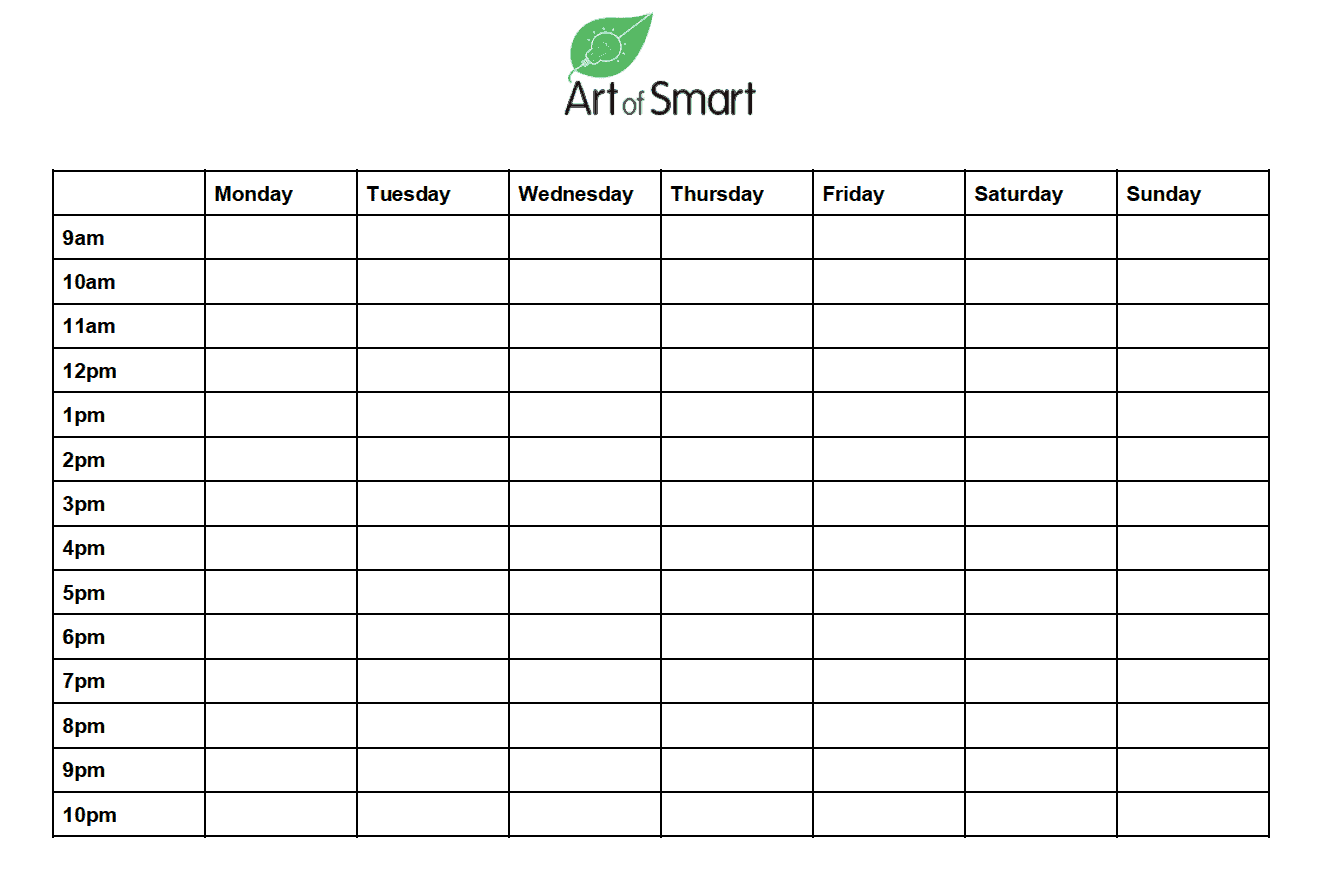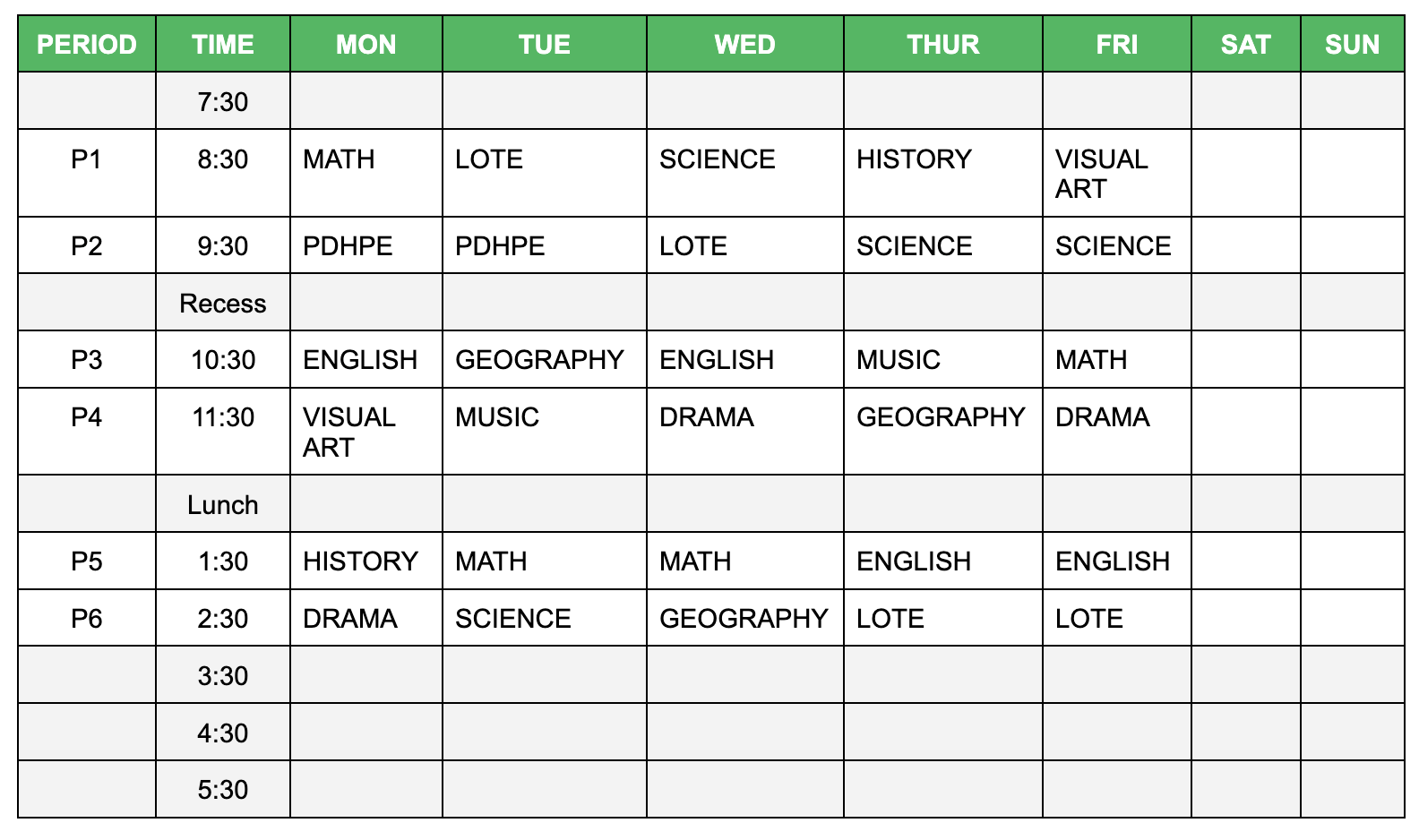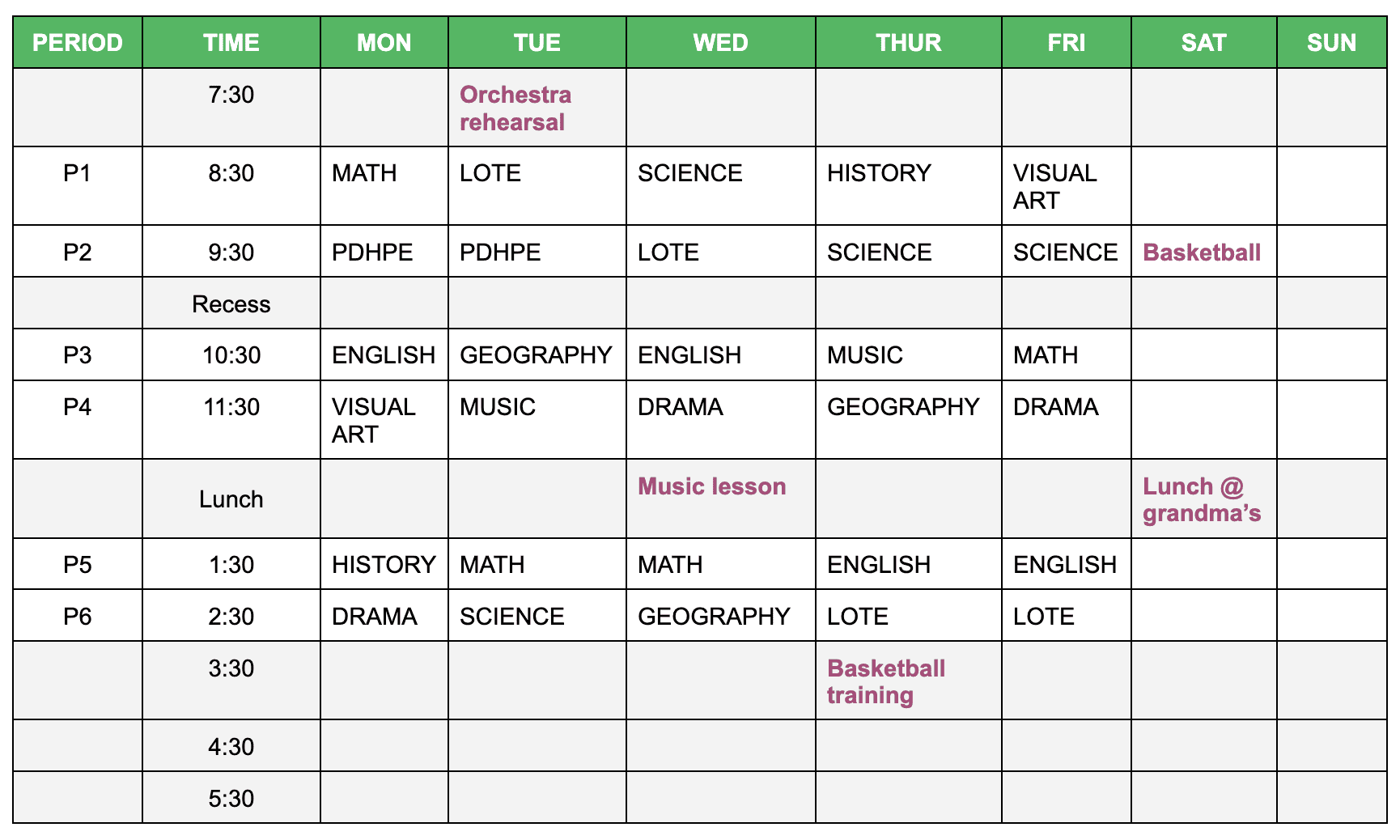Has high school got you feeling like you are constantly running out of time and perhaps you’re in need of a timetable (plus an example of how to structure it?
Whether the upcoming assessment block has you feeling overwhelmed or you feel like you’ve got so many things to keep up with, we’re here to help! We’ll guide you through creating a timetable that is effective for you.
Keep reading to find out more!
Time Management in High School
How many hours should you dedicate to studying after school?
Creating a Timetable (Example)
Time Management in High School
Whether you have just started Year 7 or you are already in your senior years, time management is an important skill that you need to develop in high school — not only is it helpful after graduation, but it also makes life a lot easier for you as well!
High school requires you to keep track of several different deadlines — you need to know when tests are coming up and when assignments need to be handed in. While your friends and teachers will likely remind you of looming deadlines, it also helps for you to have an idea of what is coming up so that nothing creeps up on you!
A good timetable helps you to finish your tasks so that when the deadlines come around, you aren’t frantically completing your assignments or staying up late to study for the test you have the next day. Or when that dreaded week of 3 assessments at once comes rolling around, you know you only have the finishing touches left to do.
However, while assignments and tests may be important — especially in the later years — it is also important for you to have fun! Hang out with friends, spend time with family, time for your hobbies, or simply lie in bed and do nothing.
The key to balancing life in high school is a good and effective timetable! This would help you to keep on top of what school requires for you but also allow you to spend time doing the things that you love.
How many hours should you dedicate to studying after school?
This would differ depending on what year you are in. While I was in high school, my school recommended 20 mins of homework per subject that you had for that day.
Six periods meant up to two hours of homework per week — certain subjects did not have regular homework (unlike maths), but this time also encompassed when you are working and preparing for assignments.
In older years, this time will extend but by then you’ll hopefully have a better idea of how much time you need to dedicate to your studies and how to manage your time! It is never too late to experiment with how you study and the best for you to organise your time — the earlier you start doing this, the more likely you are to find a system that works for you!
Creating a Timetable (Example)
#1: Five days or seven days?
Whether you choose to make a timetable for Monday to Friday or Monday to Sunday, this is up to you!
However, for senior years, we highly recommend planning for the weekends as well. This is not because the weekends are extra times for you to study, but rather it gives you an opportunity to block out times for you to rest and to do the stuff you like!
#2: Start with your school timetable
First, we will start with your school timetable! This will be the foundation of our timetable. For the example, I am going to work with a seven day timetable — if you prefer to just make one for Monday to Friday, feel free to ignore the weekends!
Colour-coding can also help you to read the timetable with more ease so feel free to go wild!
#3: Extra-curricular activities and other commitments
Your next step is to fill in all the extra-curricular you do and when they are. This is so that you are able to block out your time and you have an idea of how many commitments you have and what you might need to work around once the assignments start piling up.
However, your commitments don’t have to be just school-related either! Maybe you have lunch with your grandparents every Saturday — that should be noted in your timetable as well so that you can block out those time too. Family events and personal commitments are as important, maybe even more important, than school.
If you have commitments before school, this helps you to figure out which day you may need to go to sleep earlier which may mean that you do less work the night before. Alternatively, if you have commitments after school, then you know there may not be as much time to work on assignments that day.
#4: Homework
Your next step is to figure out how much time you need to dedicate to each subject and when you need to complete these tasks by.
While I was in high school, homework would be assigned for every Maths lesson so I made sure to set time aside for the days that I had Maths. However, if Maths is easy for you, you may finish these tasks during the lesson and don’t need to set time aside at home!
Another example is English — I enjoyed English while I was in high school and didn’t find it too tricky. Comprehension and PEEL paragraph tasks wouldn’t take me too long.
However, when assignments came around I would take a long time to write the first draft for an essay — so I would dedicate more time to English about two weeks before the final hand in.
It may also be a good idea to have a set time that you can use to catch up with missed work or to work on assignments! If things go to plan, this will be your free time.
However, during busy periods in the school year or when things fall behind this is time that you can use to catch up without sacrificing your extra-curricular activities or spending time with grandma!
Once you have spent some time observing how you study and what works best for you, fill out the timetable accordingly!
#5: Free time
Free time in my timetable you ask? Yes!
Your free time is equally as important as the commitments you have to school, and even more so in your senior years. If you’re someone who has a hard time relaxing, it is even more important to schedule your free time.
As you move into Year 11 or Year 12, it may also be a good idea to set a time when you will stop studying or a day where you don’t do school work.
For example, on Fridays after school I wouldn’t do homework or assignments so that I could rest or watch a movie instead, maybe go out for dinner with my family. Then I could catch up on work over the weekend.
If scheduling your free time doesn’t sound like your thing, just know that whatever blank boxes that are left is time that you can fill up as you like knowing that you have finished all the work you needed to do!
There you have it!
Once you have made a timetable, don’t be afraid to change it up and reorganise it again! If you think that something isn’t working out for you, the faster you change it the better it is for you.
A good timetable shouldn’t be stressful to follow and remember it is just a guide for you! Remember that it is designed to help you stay organised and manage your time.
Are you looking for some extra help with effectively managing your time?
We pride ourselves on our inspirational coaches and mentors!
We offer tutoring and mentoring for Years K-12 in a large variety of subjects, with personalised lessons conducted one-on-one in your home or at one of our state of the art campuses in Hornsby or the Hills!
To find out more and get started with an inspirational tutor and mentor get in touch today!
Give us a ring on 1300 267 888, email us at [email protected] or check us out on Facebook!
Tiffany Fong is currently completing a double degree in Media and Communications with Law at Macquarie University. She currently contributes to the university zine, Grapeshot where she enjoys writing feature articles, commentary on current affairs or whatever weird interest that has taken over her mind during that month. During her spare time, Tiffany enjoys reading, writing, taking care of her plants or cuddling with her two dogs.






